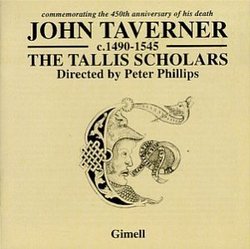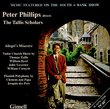| All Artists: Taverner, Phillips, Tallis Scholars Title: 1490-1545 Members Wishing: 1 Total Copies: 0 Label: Gimell UK Release Date: 10/17/1995 Genres: Pop, Classical Styles: Vocal Pop, Opera & Classical Vocal Number of Discs: 1 SwapaCD Credits: 1 UPC: 028945499529 |
Search - Taverner, Phillips, Tallis Scholars :: 1490-1545
 | Taverner, Phillips, Tallis Scholars 1490-1545 Genres: Pop, Classical
Gimell has assembled several fine performances (all previously released) of music by Taverner, the first great composer of Tudor England. Included are a free-standing Kyrie and two settings of the Easter respond Dum Transi... more » |
Larger Image |
CD DetailsSynopsis
Amazon.com Gimell has assembled several fine performances (all previously released) of music by Taverner, the first great composer of Tudor England. Included are a free-standing Kyrie and two settings of the Easter respond Dum Transisset Sabbatum, all using the typically continental cantus firmus technique, where one voice sings a chant melody in long notes while the others sing countermelodies around it. (Composers on the continent usually put the chant in the tenor part; Taverner gave it to the trebles.) But the centerpieces of the record are the two Mass cycles: the elaborate, typically English Missa Gloria tibi Trinitas, with serpentine melodies, intricate rhythms and extended duet and trio sections, and the "Western Wind" Mass with its striking folk tune continuously repeated in different voices. --Matthew Westphal Similar CDs
|
CD ReviewsIntriguing FrKurt Messick | 08/16/1999 (4 out of 5 stars) "I bought this CD after I learned that John Taverner was in fact an ancestor of the modern John Tavener. I was not exactly disappointed- although their music is nothing alike, there is a certain tranquility that Tavener lovers may find attractive. Admittedly, it does get boring, and you certainly wouldn't want to listen to it all in one go. The Western Wind Mass is a fine enough piece of music (and how thoughtful of Peter Phillips to include the folk song on which it was based) but gets quite dull after a while; The Missa Gloria Tibi Trinitas is also long but at least it is more varied. The Leroy Kyrie and Dum transisset are perhaps the most worthwhile items on the disc. The highest praise, however, must go to the Tallis Scholars- beautifully clear, perfectly tuned voices that are completely suited to this genre of music. Under Phillips, they have the power to soothe and fascinate all at once. If you like Tavener, Taverner will prove an interesting diversion; if you like Tallis or Byrd, this record is a must." So long ago, so vibrant still... FrKurt Messick | Bloomington, IN USA | 08/30/2004 (5 out of 5 stars) "--John Taverner--
Taverner was born about 1490 in Lincolnshire, England, and died not far from his birthplace 55 years later. He studied at Oxford, in the college founded by Wolsey, later re-christened Christ Church by Henry VIII. There is some controversy in the details of Taverner's religious life during the stormy period of Reformation and Counter-Reformation in England. Taverner is reported to have given up composition during this period, but again musicologists are not certain that pieces attributed to earlier years may have in fact come as late as the 1530s. Taverner was a leading musical figure in his time, a time when musical styles were changing rapidly. --Western Wind Masses-- These are unique pieces - these are the only masses in English composition based on a secular tune. There are several `Western Wynde' masses; Taverner's is generally thought to be the oldest piece, but this view is not without its critics. The styles of the later masses are quite different, so the most Taverner passed on to the others, if indeed his was first, was the idea. Taverner's mass is the most varied; (Tye's is more simple, but very stunning, particularly the benedictus. Sheppard's is the shortest of the three, only half the length of Taverner's - it is the most clear and simple of the lot.) --Missa Gloria Tibi Trinitas-- Regardless of Taverner's other composition timings, this mass comes from a relatively early period. The ornate style of the 1510s and 1520s is very evident here. It continues to inspire composers down to this day. The mass is named for chants for Trinity Sunday. It includes treble, mean, countertenors, tenor and bass. The music in the movements is roughly the same length despite varying text amounts. There are two additional pieces, the 'Leroy' Kyrie and the Dum transisset Sabbatum, more austere and simple in form. This hearkens to the older English tradition of keeping the Kyrie separate from the canon of the mass. --Liner Notes-- Being internationally acclaimed, the Tallis Scholars' CDs typically present their commentary and texts in English, French, German and Italian (together with any Latin texts); unfortunately, that is not true of this disc, which only features the English and Latin. The cover art also typically represents visual arts contemporary with the compositions - here it is reputedly a portrait of Taverner from an illuminated manuscript of Missa Gloria Tibi Trinitas, part of the Bodleian Library collections. --The Tallis Scholars-- The Tallis Scholars, a favourite group of mine since the first time I heard them decades ago, are a group dedicated to the performance and preservation of the best of this type of music. A choral group of exceptional ability, I have been privileged to see them many times in public, and at almost every performance, their singing seems almost like a spiritual epiphany for me, one that defies explanation in words. Directed by Peter Phillips, the group consists of a small number of male and female singers who have trained themselves well to their task. Their recordings are of a consistent quality that deserve more than five stars; this particular disc of pieces by Taverner deserves a place on the shelf of anyone who loves choral music, liturgical music or Gregorian chant, classical music generally, or religious music. It is truly remarkable. The pieces here were recorded at different times, and are available separately on other compilations -- the Western Wind Mass in 1993, and remainder in 1984. This disc, an anniversary disc, marks the 450th anniversary of Taverner's death. It is a great tribute." |

 Track Listings (11) - Disc #1
Track Listings (11) - Disc #1


